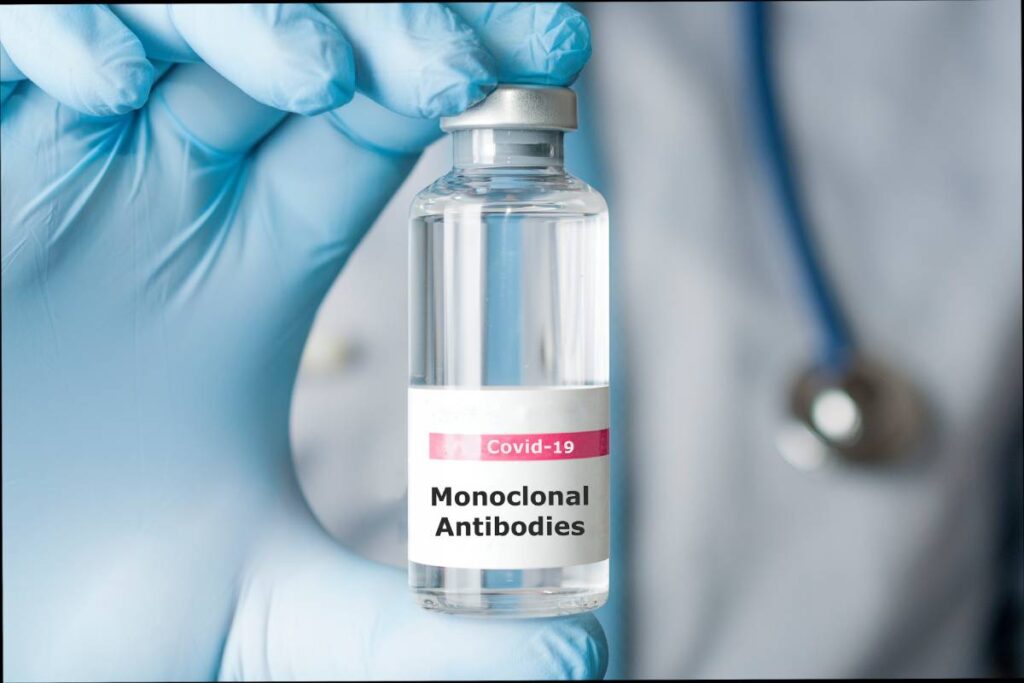As of November 29th, 2021, the disease known as Covid-19 had already resulted in over 5.5 million recorded deaths globally.1 Though the effects of the Covid-19 pandemic have been widespread, certain populations have faced a disproportionate risk of severe illness or death. These populations include the elderly, as well as individuals with pre-existing conditions like diabetes, obesity, asthma, chronic lung disease, or immunosuppression.2 Given these known susceptibilities, there has been a concerted effort to develop early disease-stage interventions for infected high-risk individuals. To this end, authors Gupta et al. designed a study to ascertain the efficacy of sotrovimab in preventing disease progression in high-risk populations.3
Sotrovimab is an engineered pan-sarbecovirus monoclonal antibody which neutralizes SARS-CoV-2, the virus which causes Covid-19, as well as a number of other sarbecoviruses. Neutralization occurs via engagement of the receptor-binding domain of the SARS-CoV-2 S glycoprotein.4 The naturally occurring antibody – known as S309, and originally isolated from a patient infected with SARS-CoV-1 – was modified to include two additional amino acids to improve half-life and increase bioavailability, improving the efficacy of the intervention.5 Additionally, sotrovimab targets an evolutionarily-conserved viral component instead of the ever-changing receptor binding motif, making it less likely to encourage antibody-resistant viral strains.3
In order to evaluate the efficacy of sotrovimab as a potential therapeutic for high-risk Covid-19 patients, the authors included a total of 868 high-risk, non-hospitalized adult patients in their study. The criteria for inclusion was a positive reverse-transcriptase–polymerase-chain-reaction test or a positive antigen SARS-CoV-2 test accompanying Covid-19 symptoms within the previous 5 days. The patients were randomized into groups of 430 and 438 patients and received either sotrovimab or placebo, respectively. Patients in the sotrovimab group received 500mg of the medication through an IV over the course of one hour, whereas the placebo group received saline. Primary outcomes were hospitalization for more than 24 hours or death within 29 days of randomization. Secondary outcomes included percentages of patients who were hospitalized, visited the emergency department, required supplemental oxygen, or died as a result of Covid-19.
Gupta et al. reported that, compared to seven percent of the control group, only one percent of patients who received sotrovimab experienced hospitalization or death, a relative risk reduction of 85 percent. Moreover, all of the five total patients who required intensive care were from the control group. Safety analysis showed approximately equal likelihood of an adverse event occurring in either group (17 percent for the control group, as compared to 19 percent for the experimental group), including infusion-related reactions.
Overall, this study suggests that not only is sotrovimab safe to use in high-risk Covid-19 patients but also may significantly prevent disease progression in patients after the onset of infection. Preventative use of sotrovimab may reduce the number of pandemic-related hospitalizations and deaths. While it remains to be seen whether the author’s findings are replicable and will withstand more advanced clinical trials, the findings of Gupta et al. represent exciting progress in the development of novel Covid-19 treatments.
References
1 Ritchie, H., Mathieu, E., Rodés-Guirao, L., Appel, C., Giattino, C., Ortiz-Ospina, E., Hasell, J., Macdonald, B., Beltekian, D., & Roser, M. (2020, March 5). Coronavirus pandemic (COVID-19) – the data – statistics and Research. Our World in Data. Retrieved from https://ourworldindata.org/coronavirus-data
2 Centers for Disease Control and Prevention (2021). People with certain medical conditions. Centers for Disease Control and Prevention. Retrieved from https://www.cdc.gov/coronavirus/2019-ncov/need-extra-precautions/people-with-medical-conditions.html
3 Gupta, A., Gonzalez-Rojas, Y., Juarez, E., Crespo Casal, M., Moya, J., Falci, D. R., Sarkis, E., Solis, J., Zheng, H., Scott, N., Cathcart, A. L., Hebner, C. M., Sager, J., Mogalian, E., Tipple, C., Peppercorn, A., Alexander, E., Pang, P. S., Free, A., Brinson, C., … COMET-ICE Investigators (2021). Early Treatment for Covid-19 with SARS-CoV-2 Neutralizing Antibody Sotrovimab. The New England journal of medicine, 385(21), 1941–1950. https://doi.org/10.1056/NEJMoa2107934
4 Pinto, D., Park, Y. J., Beltramello, M., Walls, A. C., Tortorici, M. A., Bianchi, S., Jaconi, S., Culap, K., Zatta, F., De Marco, A., Peter, A., Guarino, B., Spreafico, R., Cameroni, E., Case, J. B., Chen, R. E., Havenar-Daughton, C., Snell, G., Telenti, A., Virgin, H. W., … Corti, D. (2020). Cross-neutralization of SARS-CoV-2 by a human monoclonal SARS-CoV antibody. Nature, 583(7815), 290–295. https://doi.org/10.1038/s41586-020-2349-y
5 Ko, S. Y., Pegu, A., Rudicell, R. S., Yang, Z. Y., Joyce, M. G., Chen, X., Wang, K., Bao, S., Kraemer, T. D., Rath, T., Zeng, M., Schmidt, S. D., Todd, J. P., Penzak, S. R., Saunders, K. O., Nason, M. C., Haase, A. T., Rao, S. S., Blumberg, R. S., Mascola, J. R., … Nabel, G. J. (2014). Enhanced neonatal Fc receptor function improves protection against primate SHIV infection. Nature, 514(7524), 642–645. https://doi.org/10.1038/nature13612
